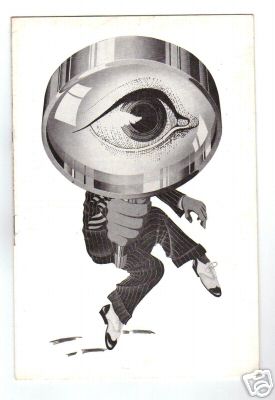One
is
accustomed to withholding certain
details, as well as the climax,
when writing about a thriller, but
in the
case
of Anthony Shaffer's “Sleuth," at
the St Martin's, one must be
very careful indeed, and in a sense
say practically nothing about the
development of the story and its
ramifications. But one can, with
enthusiasm say that “Sleuth" is an
extremely clever, unusual
entertaining play, in the front rank
of its kind, much of it of a
similar in quality to Patrick
Hamilton's “Rope".
Mr
Shaffer
strikes a frightening provocative
situation between Andrew
Wyke, successful writer of
thrillers, and Milo Tindle a younger
man, in love with his wife. In the
course of their battle of temper and
temperament their wits,
intellectually and practically, and
their
emotions, in both cases volatile
though in widely different ways.
Andrew as it were plays out the
writing of a thriller, Milo is
revealed
as a most strange type of victim. In
and out of this a dozen kinds of
detective melodrama are splendidly
parodied.
Murder
abounds;
not so much in the way of bodies,
but in depth of intent.
Pistol and blood are well in
evidence, though not at all in a
manner
you might expect. The police play
their allotted part, but Mr Shaffer
has his own special way of doing
this. Tension is generated, with
increasing force, through character,
from which comes a
persuasiveness rare for a thriller.
The
construction
of “Sleuth” is impressively shapely
and strong; there is
excellent dialogue, pointed,
amusing, chilling. always
interesting. The
character of Andrew is particularly
well drawn. Milo is no less fascinating,
even,
at times, more so, though perhaps
not totally convincing towards
the close of the play. Mr
Shaffer's
use of physical disguise, when a
clown appears, is brilliant.
In recent years, I think this device
has been matched only by Frank
Marcus in “The Killing of Sister
George" in the Laurel and Hardy
episode.
Anthony
Quayle
has never been so authoritative and
absorbing as he is playing
Andrew. Keith Baxter is outstanding,
too, with an imaginative
characterisation, rich in
implication as well as direct
density of
colouring and dramatic impact.
Clifford
Williams
has directed this compelling
entertainment with a firmly
controlled hand which unfolds
the various aspects of a complex
design with unfaltering smoothness
and conviction and there is an excellent
setting
by Carl Toms.

